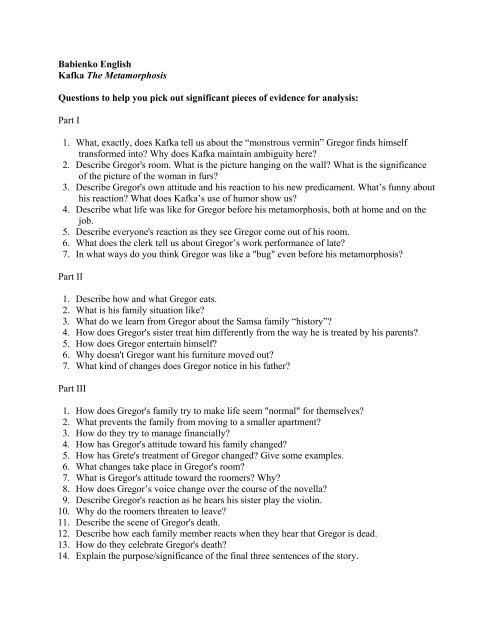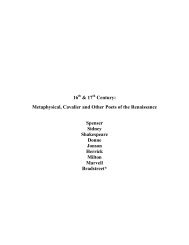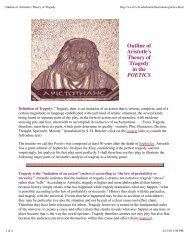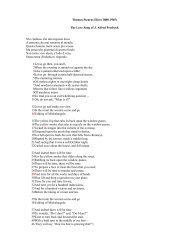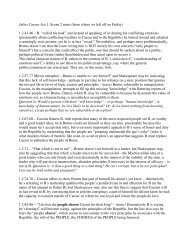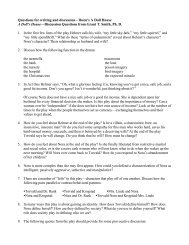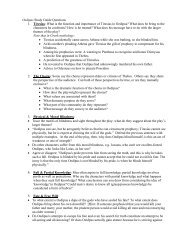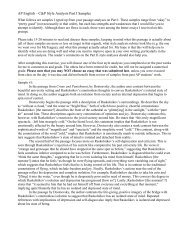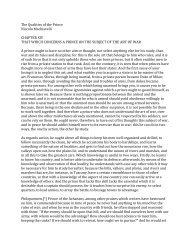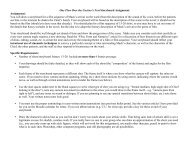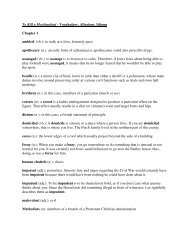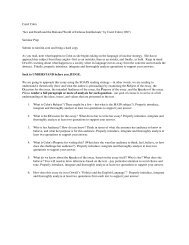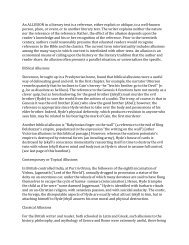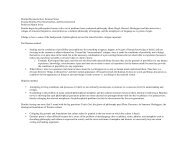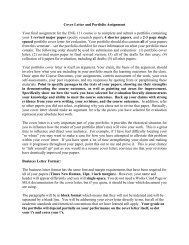Babienko English Kafka The Metamorphosis Questions to help you ...
Babienko English Kafka The Metamorphosis Questions to help you ...
Babienko English Kafka The Metamorphosis Questions to help you ...
You also want an ePaper? Increase the reach of your titles
YUMPU automatically turns print PDFs into web optimized ePapers that Google loves.
<strong>Babienko</strong> <strong>English</strong><br />
<strong>Kafka</strong> <strong>The</strong> <strong>Metamorphosis</strong><br />
<strong>Questions</strong> <strong>to</strong> <strong>help</strong> <strong>you</strong> pick out significant pieces of evidence for analysis:<br />
Part I<br />
1. What, exactly, does <strong>Kafka</strong> tell us about the “monstrous vermin” Gregor finds himself<br />
transformed in<strong>to</strong>? Why does <strong>Kafka</strong> maintain ambiguity here?<br />
2. Describe Gregor's room. What is the picture hanging on the wall? What is the significance<br />
of the picture of the woman in furs?<br />
3. Describe Gregor's own attitude and his reaction <strong>to</strong> his new predicament. What’s funny about<br />
his reaction? What does <strong>Kafka</strong>’s use of humor show us?<br />
4. Describe what life was like for Gregor before his metamorphosis, both at home and on the<br />
job.<br />
5. Describe everyone's reaction as they see Gregor come out of his room.<br />
6. What does the clerk tell us about Gregor’s work performance of late?<br />
7. In what ways do <strong>you</strong> think Gregor was like a "bug" even before his metamorphosis?<br />
Part II<br />
1. Describe how and what Gregor eats.<br />
2. What is his family situation like?<br />
3. What do we learn from Gregor about the Samsa family “his<strong>to</strong>ry”?<br />
4. How does Gregor's sister treat him differently from the way he is treated by his parents?<br />
5. How does Gregor entertain himself?<br />
6. Why doesn't Gregor want his furniture moved out?<br />
7. What kind of changes does Gregor notice in his father?<br />
Part III<br />
1. How does Gregor's family try <strong>to</strong> make life seem "normal" for themselves?<br />
2. What prevents the family from moving <strong>to</strong> a smaller apartment?<br />
3. How do they try <strong>to</strong> manage financially?<br />
4. How has Gregor's attitude <strong>to</strong>ward his family changed?<br />
5. How has Grete's treatment of Gregor changed? Give some examples.<br />
6. What changes take place in Gregor's room?<br />
7. What is Gregor's attitude <strong>to</strong>ward the roomers? Why?<br />
8. How does Gregor’s voice change over the course of the novella?<br />
9. Describe Gregor's reaction as he hears his sister play the violin.<br />
10. Why do the roomers threaten <strong>to</strong> leave?<br />
11. Describe the scene of Gregor's death.<br />
12. Describe how each family member reacts when they hear that Gregor is dead.<br />
13. How do they celebrate Gregor's death?<br />
14. Explain the purpose/significance of the final three sentences of the s<strong>to</strong>ry.
<strong>Babienko</strong> <strong>English</strong><br />
<strong>Kafka</strong> <strong>The</strong> <strong>Metamorphosis</strong><br />
Interpretive questions <strong>to</strong> <strong>help</strong> <strong>you</strong> explore MEANING<br />
1. What is the narrative perspective? How does the narrative perspective affect the meaning<br />
of the work? What parts of the s<strong>to</strong>ry/pieces of evidence suggest a potentially unreliable<br />
narra<strong>to</strong>r?<br />
2. Why did <strong>Kafka</strong> choose a beetle-like creature for Gregor’s transformation? What are the<br />
connotations of “bug”?<br />
3. Consider Gregor’s metamorphosis as metaphor – for alienation, dehumanization,<br />
fragmentation, etc.<br />
4. To what extent is Gregor more human after his metamorphosis? To what extent was he<br />
more “bug-like” before the metamorphosis? Look at irony and its purpose.<br />
5. How does the title “<strong>The</strong> <strong>Metamorphosis</strong>” apply <strong>to</strong> other characters and the relationships<br />
between them? In what ways do the family dynamics– not just Gregor – transform with<br />
Gregor’s metamorphosis?<br />
6. What objects serve take on symbolic meaning in the s<strong>to</strong>ry? What do they symbolize?<br />
7. Is the metamorphosis Gregor’s “fault”? Did Gregor bring about, or perhaps even wish<br />
for, this transformation?<br />
8. How are familial and gender roles portrayed in this work?<br />
9. Consider the themes of freedom and entrapment in this work, the irony surrounding them,<br />
and how they contribute <strong>to</strong> meaning.<br />
10. How can “<strong>The</strong> <strong>Metamorphosis</strong>” be viewed as a socially critical novella?<br />
11. How does Gregor’s ability <strong>to</strong> communicate change over the course of the s<strong>to</strong>ry? What is<br />
significance of the connection between language and music? What is the significance of<br />
language in this work?<br />
12. Why is <strong>The</strong> <strong>Metamorphosis</strong> divided in<strong>to</strong> 3 parts? Look at what occurs in each "chapter";<br />
from there, come <strong>to</strong> a hypothesis.<br />
13. To <strong>Kafka</strong>, "writing is a form of prayer." Discuss <strong>The</strong> <strong>Metamorphosis</strong> as a religious<br />
novella. Look especially at symbolism.
<strong>Metamorphosis</strong> <strong>Questions</strong> and Ideas (in no particular order)<br />
How does Gregor initially react <strong>to</strong> the discovery of his metamorphosis? Does his thinking<br />
change? How might this aspect of the narration be interpreted in terms of meaning?<br />
Significance of the loss of sight and language (ability <strong>to</strong> be unders<strong>to</strong>od)<br />
Woman in fur – unfulfilled sexual desire? Where else?<br />
To whom or what does the title refer? What is the significance of the title of the work?<br />
Possible irony?<br />
Possible interpretations of the metamorphosis:<br />
o Gregor’s metamorphosis as punishment for usurping the role of the father<br />
o Gregor’s metamorphosis as desire for escape/liberation from…?<br />
o Gregor’s metamorphosis less as a transformation, but more of an expression of his<br />
already established place in society<br />
<strong>Kafka</strong>’s novella lends itself <strong>to</strong> various schools of literary interpretation, including<br />
Marxism. What aspects of capitalist society are portrayed in the novella? How might the<br />
novella be viewed as a social critique? Are we all “dung beetles”?<br />
Comedic aspects of the novella – What are they, and what purpose do they serve? What<br />
scenes evoke “thoughtful laughter” and how do they contribute <strong>to</strong> the meaning of the<br />
work?<br />
Psychoanalysis - Familial relations, especially father/son relationship. Consider <strong>Kafka</strong>’s<br />
letter <strong>to</strong> his father (look at the paragraph that begins with “<strong>The</strong>re is only one episode in<br />
the early years”).<br />
Consider Flannery O’Connor’s statement: “I am interested in making a good care for<br />
dis<strong>to</strong>rtion because I am coming <strong>to</strong> believe that it is the only way <strong>to</strong> make people see.”<br />
How do the dis<strong>to</strong>rtions in the novella contribute <strong>to</strong> the effectiveness of the work? How do<br />
they make us see reality more effectively than literary realism?
<strong>Babienko</strong> <strong>English</strong><br />
<strong>The</strong> <strong>Metamorphosis</strong><br />
Find evidence from the text related <strong>to</strong> the following – be prepared <strong>to</strong> present <strong>you</strong>r<br />
evidence and analysis of the assigned <strong>to</strong>pic(s) <strong>to</strong> the class.<br />
<strong>The</strong> motif of clothing, especially uniforms and undergarments - How is clothing<br />
symbolically significant <strong>to</strong> the s<strong>to</strong>ry?<br />
Symbolic significance of furniture?<br />
Symbolic significance of the newspaper?<br />
<strong>The</strong> motif of food – How is it symbolically significant <strong>to</strong> the s<strong>to</strong>ry?<br />
<strong>The</strong>mes of unity and alienation/estrangement – who is unified, who is alienated?<br />
When?<br />
Motif of speech and language – significance? How is speech/language related <strong>to</strong><br />
unity and alienation?<br />
Reversal and switching of roles – how do the family dynamics metamorphose?<br />
Symbolism of the apple attack – what is going on there?!!<br />
• Punishment for attempting <strong>to</strong> “kill” the father<br />
• Revenge on family for enslaving him – freedom <strong>to</strong> act on his repressed desires<br />
• Gregor’s bourgeois enslavement and desire for liberation<br />
• Gregor’s enslavement as “man” > critique of patriarchal society<br />
• Gregor’s desire for the female other/<strong>to</strong> be the female other<br />
• Critique of language – inherent instability of language & system of<br />
representational logic (in which something represents something else:<br />
signifier/signified) > metaphor especially cannot be identical <strong>to</strong> signified ><br />
exposes fallacy of stability in language, naming, identity, knowledge…. What IS<br />
Gregor? Undefinable> Communication/connection between beings relies on<br />
stability/decidability of language > otherwise=alienation & estrangement from<br />
others > “cut off”<br />
o Yes, this is where deconstruction comes in (critique of representational<br />
logic/language). No, deconstruction is NOT simply: X is only X, because<br />
it is not Y; this is a serious oversimplification.
<strong>Babienko</strong> <strong>English</strong><br />
<strong>The</strong> <strong>Metamorphosis</strong><br />
Springboards for interpretation – these are beginnings of ideas <strong>to</strong> <strong>help</strong> <strong>you</strong> develop ways<br />
<strong>to</strong> think about the text using critical theory. I am just brains<strong>to</strong>rming here, so these may<br />
indeed overlap:<br />
<strong>The</strong> <strong>Metamorphosis</strong> as:<br />
• punishment for attempting <strong>to</strong> “kill” the father (Oedipal)<br />
• revenge on family for enslaving him – freedom <strong>to</strong> act on his repressed desires<br />
• a representation of Gregor’s bourgeois enslavement and desire for liberation<br />
• a physical manifestation of Gregor’s enslavement as “man” > critique of<br />
patriarchal society<br />
• a s<strong>to</strong>ry of selfless suffering > Gregor as Christ figure who must be sacrificed in<br />
order for his family <strong>to</strong> be resurrected (apple, cave, nailed <strong>to</strong> the spot, etc.)<br />
• representative of a metamorphosis in gender roles and the consequences of<br />
upsetting traditional gender roles > the “horror” of no male patriarch > the female<br />
in charge as monstrosity, an abomination that must be dealt with/traditional order<br />
must be res<strong>to</strong>red<br />
• an expression of Gregor’s desire for the female other/<strong>to</strong> be the female other/ <strong>to</strong><br />
have a balance between the feminine and the masculine (anima/animus)<br />
• a critique of language & representational logic that serves as the basis for<br />
language – inherent instability of language & system of representational logic (in<br />
which something represents something else: signifier/signified) > metaphor<br />
especially cannot be identical <strong>to</strong> signified > exposes fallacy of stability in<br />
language, naming, identity, knowledge…. What IS Gregor? Undefinable><br />
Communication/connection between beings relies on stability/decidability of<br />
language > otherwise=alienation & estrangement from others > “cut off”<br />
o Yes, this is where deconstruction comes in (critique of representational<br />
logic/language). No, deconstruction is NOT simply: X is only X, because<br />
it is not Y; this is a serious oversimplification.<br />
<strong>The</strong> metamorphosis represents:<br />
• the desire <strong>to</strong> reclaim the repressed, “animalistic” side of his humanity.<br />
• a realization of Gregor’s truly loathsome state as a human (self-hatred)<br />
• a realization of Gregor’s true powerlessness within the family.<br />
• a realization of Gregor’s true powerlessness within society.<br />
• a manifestation of society’s rejection of the “other” – e.g. the artist as “useless”<br />
and even “criminal/asocial”<br />
• as process of recognizing the “truth” of his condition/situation – as “vermin” <strong>to</strong><br />
his family – shattering of delusion of self-importance, “savior” image<br />
• Gregor’s realization of guilt (Schuld is both debt. and guilt in German) for<br />
“various transgressions”<br />
o father punishing son for…..<br />
o desire <strong>to</strong> replace father<br />
o desire <strong>to</strong> be more “feminine”<br />
o what else?


